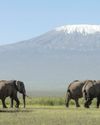Luke Bailes, the conservation giant behind Singita, has a 100year plan to save Africa’s wildlife. Joel Lovell takes a few bumpy f lights around the continent to find out what it looks like.

On the western edge of the Serengeti, two dozen employees of the luxury-safari company Singita gathered in a circle beneath a giant fig tree. As corporate meeting spots go, this one, on the 350,000- acre Singita Grumeti reserve in northern Tanzania, wasn’t bad. About a hundred yards from where we sat, four giraffes and a small herd of zebras grazed in the midday heat. Less than a quarter mile up the red-dirt path we’d bounced along to get here, two lions slept in the shade of a rocky outcropping, a partially devoured wildebeest splayed between them. Monkeys chattered in the trees; small, impossibly kaleidoscopic birds—lilac-breasted rollers—flitted through the air.
Luke Bailes, the company’s founder and CEO, stood up to address his staff. There were lodge managers and chefs and conservationists and guides, most of them black Africans, many from local villages, who had been trained by Singita and had risen through the company. Bailes is tall and handsome in a patrician, head-on-a-coin kind of way. Anyone who knows anything about Africa will tell you how influential he is. In sub-Saharan Africa, tourism accounts for nearly a tenth of the GDP, and government ministers recognize that this is where a significant part of their economic future lies. African leaders call Bailes directly to explore whether he might open lodges in their countries. The previous day, on our flight from Zimbabwe to Tanzania, he described a recent meeting with Paul Kagame, Rwanda’s president, who lent him a helicopter to survey land for a possible lodge—to be opened in 2019—near Volcanoes National Park.
Denne historien er fra April 2017-utgaven av Condé Nast Traveler.
Start din 7-dagers gratis prøveperiode på Magzter GOLD for å få tilgang til tusenvis av utvalgte premiumhistorier og 9000+ magasiner og aviser.
Allerede abonnent ? Logg på
Denne historien er fra April 2017-utgaven av Condé Nast Traveler.
Start din 7-dagers gratis prøveperiode på Magzter GOLD for å få tilgang til tusenvis av utvalgte premiumhistorier og 9000+ magasiner og aviser.
Allerede abonnent? Logg på

The Brando
THE STORY GOES that actor Marlon Brando first arrived on the 18-isle atoll of Tetiaroa by water-as in, he swam ashore.

Jumeirah Burj AI Arab
IF EVER THERE WAS a hotel that could achieve landmark status, it is Dubai's Jumeirah Burj AI Arab, which stands alone on its own purpose-built island just off Jumeirah Beach.

Blackberry Farm
BLACKBERRY FARM LOOMS in the consciousness of many travelers as an almost mythical Southern sanctuary in the foothills of the Great Smoky Mountains, a place whose storybook perfection has to be experienced to be believed.

Fogo Island Inn
THIS 29-ROOM MODERN CLASSIC in Newfoundland is a model for place-specific hospitality, dreamed up by founder Zita Cobb and built by Shorefast, a nonprofit that supports economic and cultural resilience on the hotel's namesake island and runs artist residencies in four isolated, incredibly photogenic studios.

ALAN CUMMING on CROSSING THE ATLANTIC
I went on Cunard's Queen Mary 2 for the first time in 2011.

high life
Italy's unfussy Dolomites are a place of cheerful communities, where simple chalets and good food can almost outshine the skiing

the possibility of an island
Cuba may be facing tough times, but the country's hoteliers, creators, and artists are forging a hopeful and beautiful way forward

in full bloom
Over the past three years, hotelier Fabrizio Ruspoli has turned an old olive farm south of Marrakech into the High Atlas's most intoxicating garden retreat

ALLIN
Fun has never been hard to come by in Las Vegas, but the arrival of pro sports, the Sphere, and lavish new hotels has upped the ante.

Forward March
Across Kenya, community initiatives are protecting the country's wildlife and environment. By Mary Holland